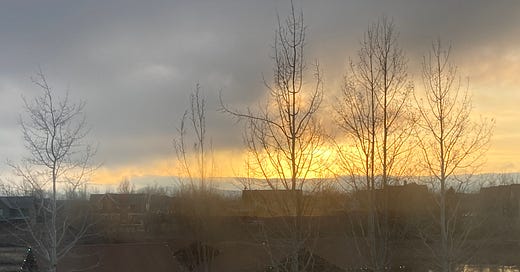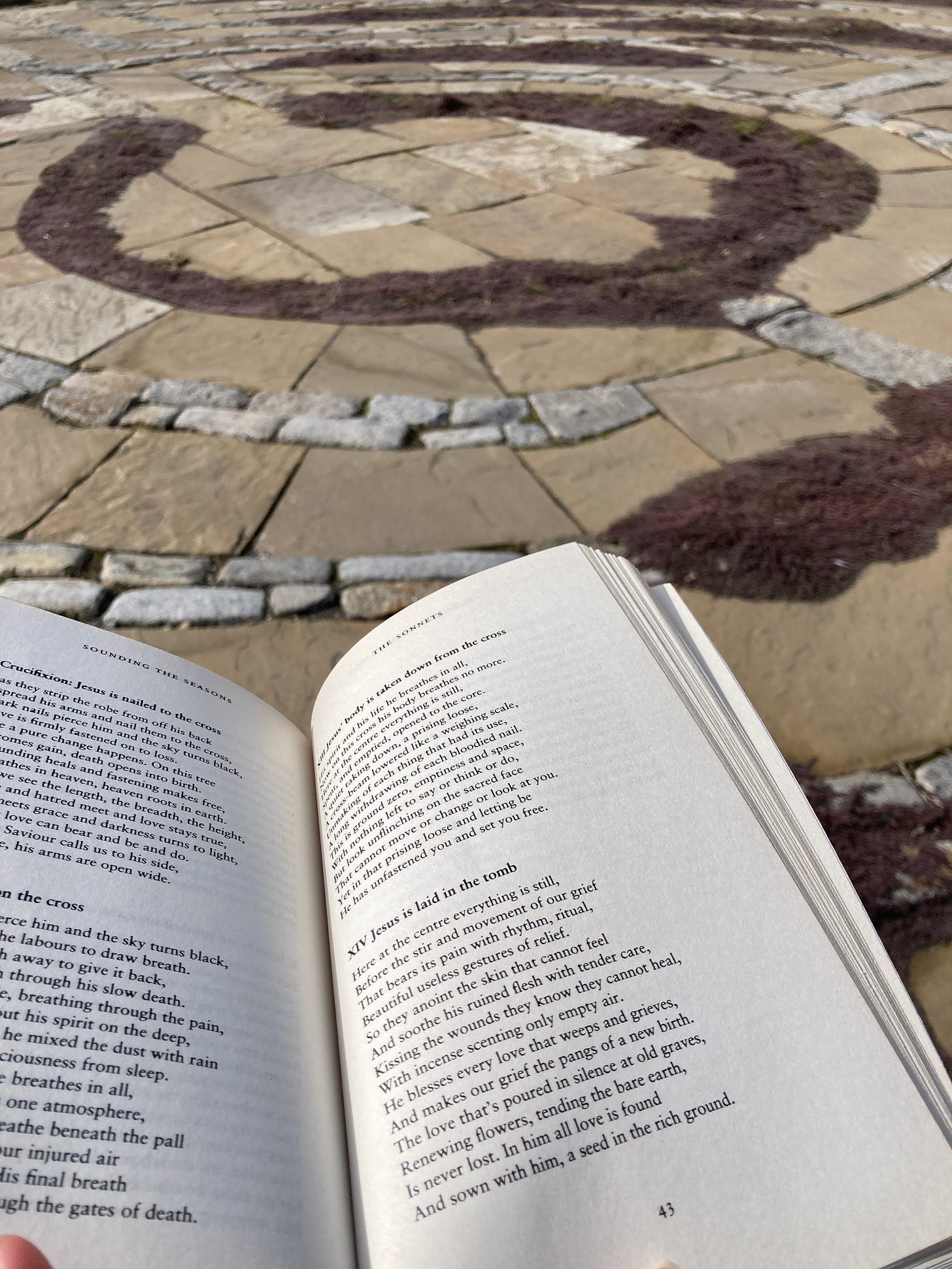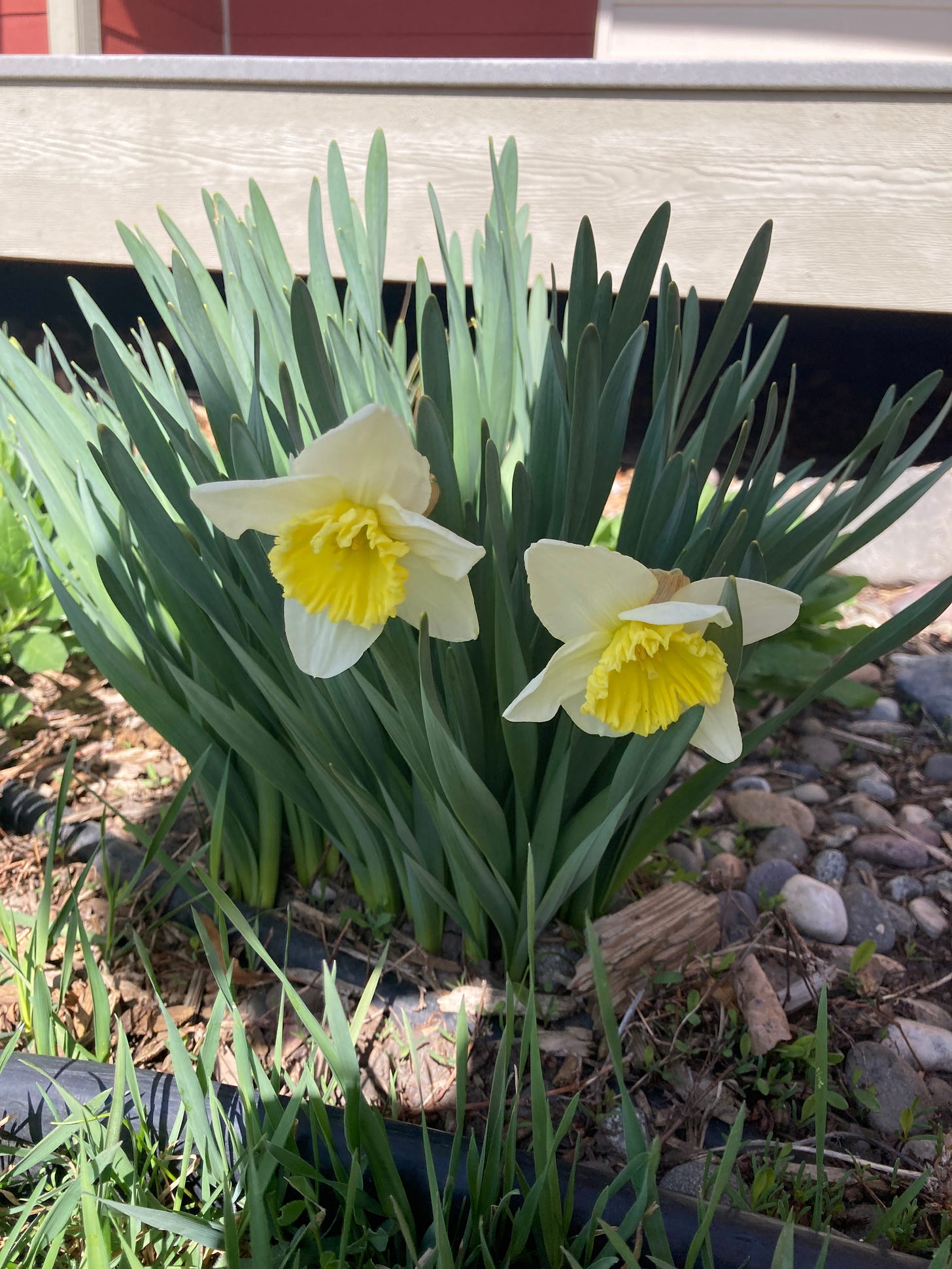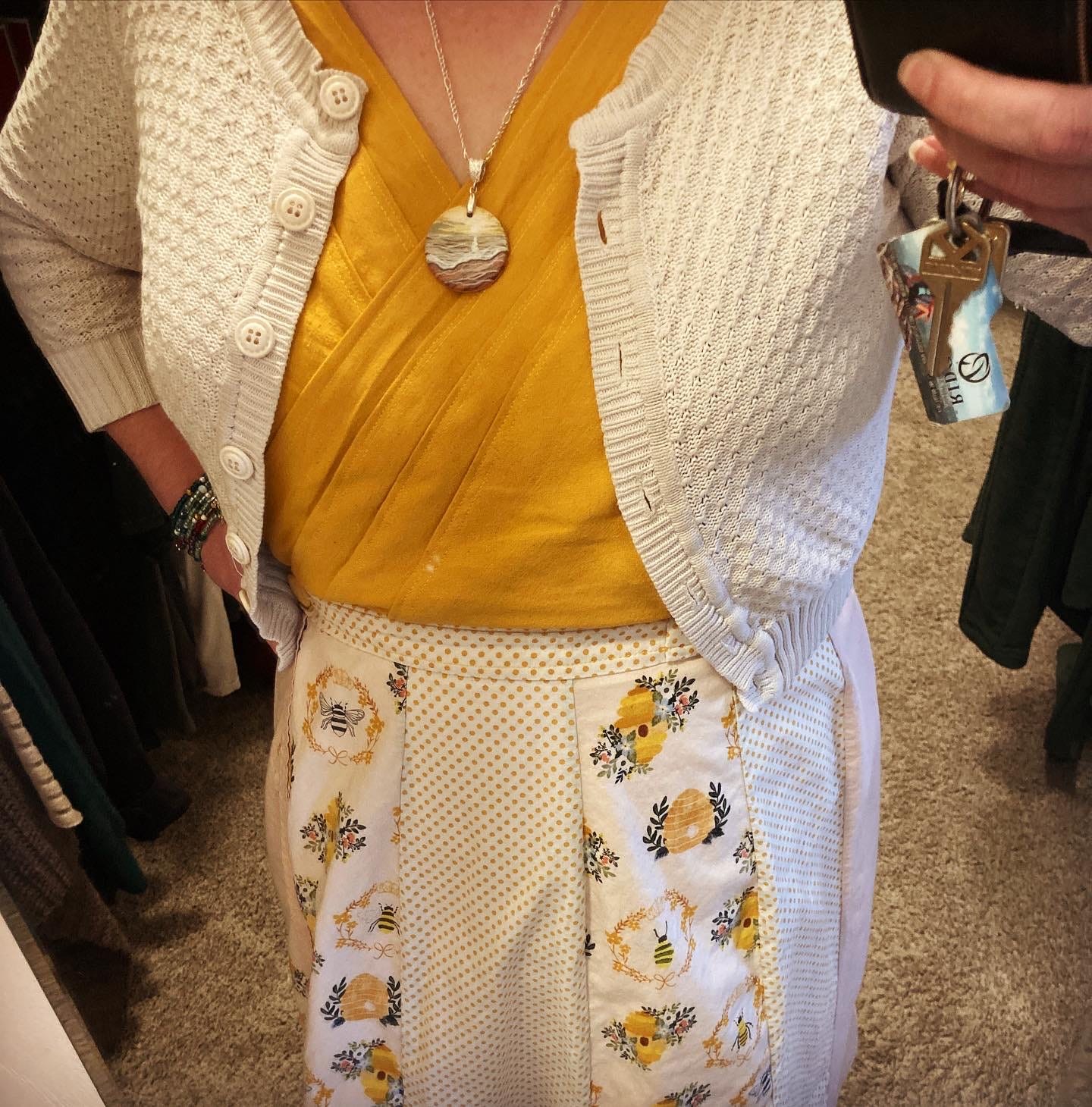“He’s alive, but where is he? I guess we’ll go back to what we know…” These are the words that tumbled out of another directee’s mouth as we met for group spiritual direction this week, our last session of a Lenten retreat that inadvertently spilled over into Eastertide1. I wrote her words down then, and haven’t been able to let them go since.
Her words summarized the thoughts of the disciples as they returned to fishing in John 21. Jesus had already appeared to them, but it’s not like they were actively following him around in the wake of his resurrection as they had done before his death. A group of disciples was hanging around together when Simon Peter said, “I’m going out to fish.” and they said, “We’ll go with you.” They might has well have said, “He’s alive, but where is he? I guess we’ll go back to what we know.” Back to the Sea of Galilee, the boats, the nets, back to fishing in the dark for fish, instead of men, if they could catch any.
And here we are, on the brand new cusp of Eastertide, having just come through the wilderness to a resurrection of our own. We’ve had the dragon scales peeled from our tender flesh like Eustace Scrubb and have been made new through a painful ordeal. But what now? Do we turn back to what we once knew, plunging again into old habits, or do we let them return to us slowly, familiar comforts that dull the ache of all that is not yet what it will be?
If Lent is the journey, Easter is the destination, stretching out fifty days on the other side of the wilderness, a paradisiacal promised land for those who make it through. Easter is the feast of all feasts, a season of goodness and flourishing, land flowing with milk and honey not in space, but in time.
He is risen! He is risen, indeed! But where is he? Guess I’ll go back to what I know. Or, if not to what still has a hold on me after Lent, at least to fighting the same battles I did before. The disciples in this story return to fishing the Sea of Galilee under Roman rule, under the same oppressive government that held them before, only with additional persecution now that they have outed themselves as followers of Jesus. And I still dwell in the same place with the same temptations and the same struggles. Because I don’t know how well your Lenten fast went, but if it was anything like mine there is still work to do.
This year I, along with a number of other people and
, observed a digital fast. I struggled with this digital fast in some of the same ways I struggle with food fasts in other years, mostly stemming from the fact that it’s not exactly feasible to be cut off completely for forty days. I often feel like I would have fewer battles with food if I just didn’t have to eat. And I am convinced that maintaining a digital fast would be simpler if I didn’t need to use my computer occasionally to write or my phone to make calls. It would be easier if I could just lock away all my devices and call it Lent, right? But then I hear the words of Antony the Great2 echoing within me:He who sits alone and is quiet has escaped three wars: hearing, speaking, seeing: but there is one thing against which he must continually fight: that is, his own heart.
~Antony the Great
I know that Antony is right; my struggle with fasting during Lent isn’t primarily a struggle against unhealthy food or digital habits, but against my own heart’s inclination to seek fulfillment in places it cannot be found. I have no doubt that if I moved to the desert and took up hermitage in a cave I would find it much harder to fast, without the convenient scapegoat that social media’s algorithms targeting my dopamine receptors offers. True though it is that there are insidious digital demons at play, the deeper truth is that I would struggle no matter what the fast. And so, I find myself on the other side of the wilderness, and still my sandals are full of sand, inviting blisters as I walk into Eastertide.
I think what this means is that I am not yet done with my digital fast, at least as a perpetual assessment of my digital usage and ongoing invitation to analog living. Here are the things I had hoped for at the outset, and a brief assessment of how it went during Lent:
I will use my (work) computer at work, for work. This worked pretty well.
I will use my (personal) computer to write Substack posts and Borrowed Words weekly. I did not include our weekly church litanies or weekly Taize liturgies or any of the prep work for hosting two retreats and a poetry conference session. I gained a better idea of more of the legitimate ways I use my computer in preparation for life-giving in-person gatherings.
I will use my phone to engage on the Black Barn Online, specifically with Borrowed Words and Celebration Saturday and responding to messages. I found that my engagement in the Black Barn was a little slower overall during Lent, but perhaps having a couple others write guest posts contributed to that feeling of dampened engagement. I didn’t feel like there were any conflicts with my digital fast and my Black Barn participation during Lent.
I will do research for my writing using books / printed material and will utilize the library instead of the computer for research. I went to the library exactly zero times during Lent. I think I just didn’t research instead of doing that online. I did turn to the books on my shelves, where I could.
I will use my (personal) computer for zoom meetings, especially those zoom meetings that help me engage with others in the direction that God is leading me. This looked like participating in a couple online Lenten retreats with Anam Cara and my spiritual director. It also included participating in zoom calls with the Black Barn, and meeting with my writing group and book group via zoom / Discord. These all felt like they fell within the parameters of my digital fast. (I also started participating in a Lenten book discussion with another group and after the first meeting it felt like too much, so I gave myself permission to back out of that one.)
I will use my phone to connect with people instead of longer text threads. I actually talked to people on the phone instead of having text conversations with them more during Lent, and this is something I would like to continue into the future. I also started using the Marco Polo app with my childhood best friend, and we have connected more in the last couple months than we have in decades. There is something to the face-to-face and voice-to-voice communication that is good, even if it is digitally mediated.
I will lean into analog activities and in-person community connections. I definitely leaned into in-person community connections this Lent and it was good. I participated in as many in-person conferences and retreats as I did online, which is a shift from where I have been in the past. I am looking forward to continuing to build my in-person community connections in the future as well.
I will use my (personal) computer to submit poetry for publication. I did this, but not as much as I would have hoped. I submitted two sets of poetry, and wish I had made a more concerted effort to use my digital time in this way instead of some others.
I will close computer tabs when I close the computer. Nope. I still have so. many. tabs. open on my computers, and my phone. I’m trying to get better at this, but this is one I definitely did not do well during Lent.
I will post on and respond over social media on Saturday night / Sunday only, and I will not scroll. This one started out pretty well and went downhill. By the end of Lent I was back in the familiar wilderness territory that I had hoped to leave. I more or less only use Instagram, and I have some genuine, good things happening over there that I’m hesitant to walk away from. But I’m also very aware that they’ve got the algorithm dialed in and I get sucked in when I don’t want to be.
I will not buy items online from Amazon, buying from local shops instead. I didn’t purchase anything from Amazon, so that was a win. But this felt more like a temporary abstinence, and not a true shift in my habits. I just didn’t buy things, instead of buying them locally. It’s kind of the store version of the library situation above.
So… that’s how my Lenten fast went. I wish I could say that I’ve gotten myself all sorted out and am living in a digital paradise now, all garden and no wilderness. But I’ve still got work to do. I’m afraid that I, like the disciples, tend to return to what I know a little too easily.
The good news is that their return to fishing the Sea of Galilee isn’t the end of the story. At the conclusion of a long season of Lent night of fishing, in which I didn’t break free from my digital shackles they caught nothing, Jesus met them where they were. He sat on the beach with provisions and called to them, “Friends, haven’t you any fish?” At their reply of ‘no,’ he told them, “Throw your net on the right side of the boat and you will find some.” Here, at the end of the story, we are reminded how it began: with abundance where there had been none. As the disciples came to shore, they found fish and bread, another reminder of the miraculous abundance they had witnessed as Jesus took the bread, blessed it, broke it, and gave it. We’ve seen this before— It’s the start of something new. And isn’t that what we call Easter?
Florilegium Finds: Quotes from my Commonplace Book
One of the ways that Lent is bleeding into my Eastertide is through the Desert Fathers. I had hoped to be done with the wilderness but, alas, I am not. Easter Monday was a beautiful day that filled me with sadness as I walked in the sunshine. All is not as it should be, and, apparently, even Easter has space for lament. So here I am, in Eastertide, companioned by the wisdom of the Desert Fathers as I walk the path before me. An as it turns out, The Desert Fathers is a commonplace book, with quotes grouped according to virtue. I quoted Antony above, but here are a few other gnomes taking up residency in my heart.
Evagrius said, “Some of our predecessors used to say that a dry and regular diet combined with love will soon bring a monk to the harbor where the storms of passion do not enter.”
Poemen also said, “Grief is twofold: it creates good and it keeps away evil.”
A brother asked him, “How ought we to live?” Poeman replied, “We have seen the example of Daniel. They accused him of nothing except that he served his God.”
Macarius said to Zacharias, “Tell me, what makes a monk?”… Zacharias said to him, “As far as I can tell, abba, I think anyone who controls himself and makes himself content with just what he needs and no more, is indeed a monk.”
What’s Working Right Now: Embracing the Analog
I thought I’d share some of the analog practices I have found helpful during my digital fast and invite you to join me in embracing a slower, less digitally mediated way of life. Here are some ideas for embracing the analog…
Walk where you can. For me this week, that has included walking to work and walking to the Market for coffee and a little local shopping.
Use a paper planner. I’m only partially in this place, but for my creative projects, since my phone or computer tend to be a distraction from those in particular, I have been keeping a paper planner where I can track when I want to work on particular projects and what progress I made during each session. It isn’t fancy, but it does help keep me on task and on track.
Read real books. I am not opposed to reading on a kindle, but I find I connect with and remember what I read better when I’m reading on paper. Reading paper books seem to have a positive impact on my stress levels, too.
Print articles to read. Along the lines of reading real books, I’ve started printing out the articles I want to read and reading them in a non-digital format. This has done a couple things. First, it makes me think about what I’m willing to invest paper and toner in. If I’m not willing to invest paper and toner, why am I willing to invest my attention and time and a bit of my soul in this? Second, it causes me to linger over what I do invest in reading, appreciating the images, underlining and annotating the text, and engaging with the words the way I would a book. In essence, printing the articles helps me treat them like something with lasting value instead of a momentary dopamine hit that is forgotten as soon as the buzz has worn off.
Keep a commonplace book. You’ve heard this suggestion from me before, but I’ll take a moment to say it again. One of the most formative practices I have is keeping a physical commonplace book where I jot down quotes and passages from what I’m reading that I want to become commonplace within my heart, mind, and soul. It has become a source of worthwhile material on which to meditate and wrestle with as I continue to learn what it is to be human.
Write with pen and paper. Whether it’s writing journal entries, poems, letters, or to-do lists, I encourage you to pick up a pen and write an analog version first. If it needs to be typed, you’ll end up with a more polished draft, and if it doesn’t need to be typed a handwritten letter is well-received and you’ll remember what you wrote down better by journaling and writing notes by hand.
Mend and make your own clothes. This one takes a little more setup and learning, but there’s something about the process of making or mending something that moves us from consumer to contributor. What I make isn’t the most fashionable, but it brings me a fair amount of joy to wear what I’ve made and to know that I’m actively choosing to circumvent fast fashion practices with my own wardrobe. It also makes me happy to mend something instead of throwing it away.
Grow your own food. Maybe not all of it, but grow what you can. Start a few seeds, see what they grow. Eastertide is perfect for sowing hope and reaping abundance. I’ve got tomatoes and peppers in my guestroom windowsill and I’m already looking forward to the salsa I know they will become at the end of summer.
Do it with others. Whatever it is, whether eating dinner or going for a walk or watching a documentary, do it with someone else. Take advantage of little moments of connection to grow deep relationships rooted in real-life time spent. It’s worth it.
What are your analog suggestions? What’s working for you right now?
It feels like so much of Lent has spilled over into Eastertide this year. Due to my spiritual director’s family emergency the day we were supposed to finish up our Lenten retreat, we pushed it back a week and ended up with our last session during the first week of Easter. I’m not glad for the emergency her family endured, but I am thankful that this retreat spilled into the next week. It was only fitting for the lines between Lent and Easter to be blurred as much in this retreat as they were in my heart.
As quoted in "The Desert Fathers: Sayings of the Early Christian Monks” translated by Benedicta Ward for Penguin Classics












I really appreciate your breakdown of all this, Elizabeth. I’m pondering some of these more now. Numbers 9 & 10 on your Lenten Fast realizations really struck home for me. Good thoughts on the analog life, too--I prefer writing with pen and paper first, too, though I’ll leave the sewing to my daughter, Evie. It has not, and I doubt ever will be, a relaxing, rewarding practice for me!
Thanks so much for your thoughtful and detailed reflections Elizabeth! I particularly appreciated your summary of what worked and what didn't as well as section on "embracing the analog". I'll be sure to share your post with my reader's!